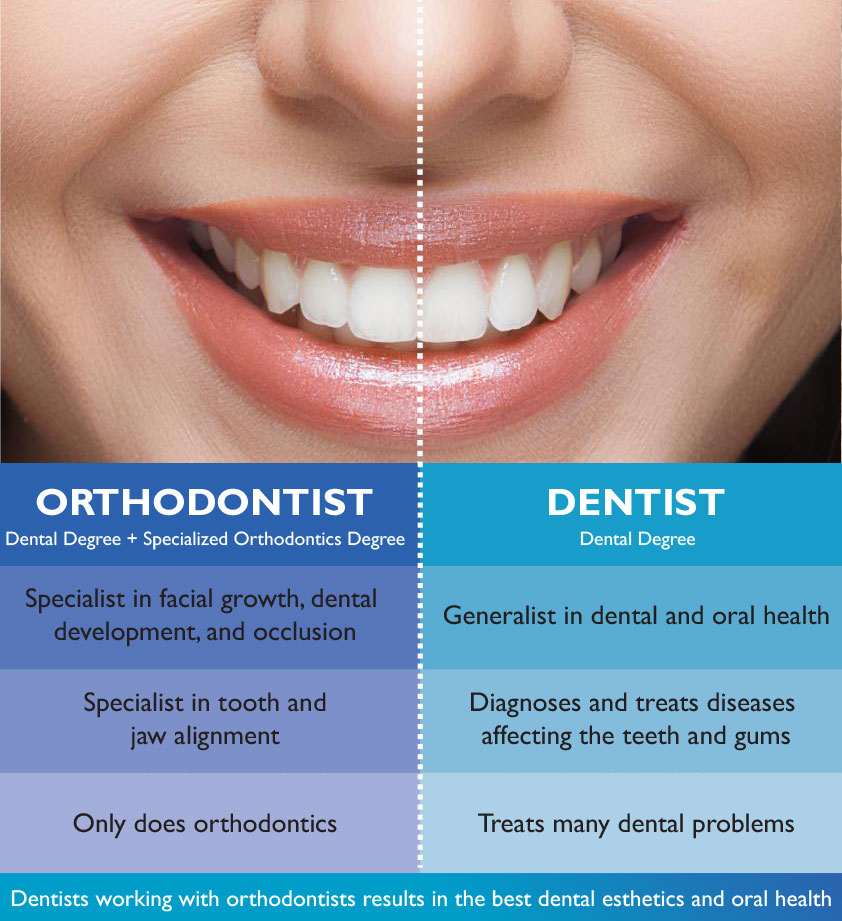About Causey Orthodontics
About Causey Orthodontics
Blog Article
Top Guidelines Of Causey Orthodontics
Table of ContentsCausey Orthodontics - QuestionsIndicators on Causey Orthodontics You Should KnowNot known Details About Causey Orthodontics Everything about Causey Orthodontics6 Simple Techniques For Causey OrthodonticsThe 45-Second Trick For Causey OrthodonticsLittle Known Facts About Causey Orthodontics.
What is the difference in between a dental expert and an orthodontist? All dental practitioners, including orthodontists, deal with the teeth, gums, jaw and nerves.
Orthodontists and dentists both provide oral care for clients. Orthodontists can function in a dental workplace and offer the exact same therapies as various other dental experts. So you can think about both physicians who deal with gum tissue and teeth problems. The major distinction is that ending up being an orthodontist needs a particular specialty in dealing with the imbalance of the teeth and jaw.
Causey Orthodontics - Truths
An orthodontist is a dentist that has undertaken training to specialize in the diagnosis, avoidance and treatment of abnormalities in the jaw and teeth. They can also determine possible problems in teeth positioning that may create when problems are left neglected (orthodontist services).
This includes all the necessary education and learning to come to be a basic dental practitioner. According to the American Student Dental Association (ASDA), it suggests you will need to have either a Physician of Medication in Dentistry (DMD) or a Medical Professional of Oral Surgery (DDS). Simply put, orthodontists require to complete dental institution and afterwards acquire an orthodontics specialized education and learning.
Some orthodontists likewise obtain their masters in craniofacial biology. emergency orthodontist near me (https://justpaste.it/6i5ds). Lots of dental colleges give restricted orthopedic training and direction, which is why general dental practitioners require to visit orthodontic college after college graduation. Orthodontic residency programs offer extensive training for this kind of oral field of expertise. These programs concentrate on two details areas or disciplines: Dentofacial Orthopedics: This study concentrates on directing teeth and jaw growth.
Get This Report on Causey Orthodontics

 These consist of apparatus such as dental braces, retainers and Invisalign. So, what does an orthodontist do, and what do they concentrate on? The overall objective of an orthodontist is to enhance a client's bite. Not everyone is born with straight teeth, and an orthodontist will certainly ensure that patients get uniformly spaced straight teeth.
These consist of apparatus such as dental braces, retainers and Invisalign. So, what does an orthodontist do, and what do they concentrate on? The overall objective of an orthodontist is to enhance a client's bite. Not everyone is born with straight teeth, and an orthodontist will certainly ensure that patients get uniformly spaced straight teeth.
Our Causey Orthodontics Statements
The American Organization of Orthodontists recommends your very first check up by age 7. You'll require to see your orthodontist if you have a misalignment in your teeth, additionally understood as malocclusion. Additionally, if you discover irregular bite patterns, a slightly askew jaw, or when your teeth are chock-full, you will likely require orthodontic therapy.
At Advanced Orthodontics, we supply individuals with a alternative treatment experience. Additionally, we provide adjustable treatment schedules, versatile payment alternatives and a fun, pleasurable experience. Telephone call ( 480) 357-4900 today for even more info and timetable an appointment.
An orthodontist is a dental expert trained to diagnose, prevent, and deal with teeth and jaw abnormalities. They remedy existing problems and are educated to determine problems that may develop in the future. Orthodontists collaborate with people of every ages, from children to adults. People commonly link an excellent smile with healthiness.
Rumored Buzz on Causey Orthodontics
Malocclusion, or misaligned teeth, can lead to oral problems, including tooth decay, periodontal condition, and challenging or uncomfortable eating. Not every person is born with straight teeth. If you have a bad bite or big areas in between your teeth, you may wish to consult a dental expert concentrating on orthodontic treatment.
(Picture Credit: DigitalVision/Getty Images) Orthodontists make use of dealt with and detachable oral tools, like dental braces, retainers, and bands, to transform the setting of teeth in your mouth. Orthodontic therapy is for dental irregularities, including: Uneven teethBite troubles, like an overbite or an underbiteCrowded teeth or teeth that are too much apartJaw misalignmentThe objective of orthodontic therapy is to improve your bite.
About Causey Orthodontics

All orthodontists are dental practitioners, yet not all dental professionals are orthodontists. Orthodontic residency programs provide extensive, focused direction for dental specialists. They concentrate on 2 areas: Just how to properly and securely relocate teeth Just how to appropriately guide advancement in the teeth, jaw, and faceOnce an orthodontist has actually completed training, they have the option to become board licensed.
Malocclusion leads to tooth congestion, a misshapen jaw, or uneven bite patterns. Malocclusion is typically treated with: Your orthodontist attaches steel, ceramic, or plastic square bonds to your teeth.
See This Report about Causey Orthodontics
If you have just small malocclusion, you may have the ability to utilize clear dental braces, called aligners, rather of standard dental braces. Some people require a headgear to help move teeth right into line with stress from outside the mouth. After dental braces or aligners, you'll need to wear a retainer. A retainer is a custom device that keeps your teeth in area.
Report this page